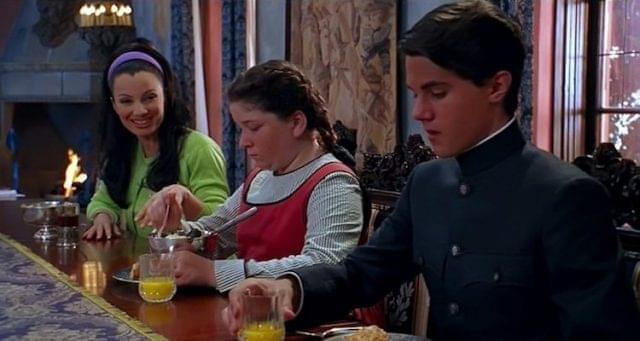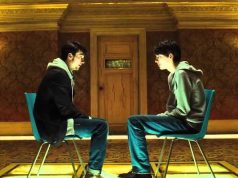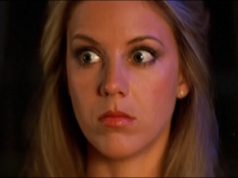
Throughout most of the 1990s, there was a sitcom on TV called The Nanny. It starred Fran Drescher as a horrifically annoying woman who brayed like a donkey while taking care of a wealthy British man’s children. The series was relatively popular, primarily among the deaf and hard-of-hearing, and at the height of its fame is when Drescher’s The Beautician and the Beast was released in theaters. It tanked — probably because everyone knew it was going to be just like The Nanny, which they could watch at home for free, and without having to admit to anyone that they were watching it.
Another reason it tanked: It was called The Beautician and the Beast. Isn’t it nice how sometimes you can tell a movie is bad just by its title? When you hear the description, it becomes even more obvious: Drescher plays a New York hairstylist who is mistaken for a teacher and hired by the president of an Eastern European country to educate his children. It’s like The Sound of Music, but with Capt. Von Trapp played by Boris Badenov and Maria played by a goat. Or it’s like The King and I, only instead of being overlong, racist, and condescending, it’s merely stupid.
Stupidity propels most of the plot. Indeed, without stupidity, the film would cease to exist. It would be like subtracting skankiness from Lindsay Lohan. We begin in New York, where Joy Miller (Drescher) is a tacky Jewish girl in tacky clothes who teaches night-school hairstyling courses to people who also wish to be tacky. (Yes, you may rest assured that one of her pupils is flamboyantly gay.) One night someone stupidly sets a fire in the classroom, makes it worse through the use of further stupidity, and Joy’s picture winds up on the front page of the paper the next day.
This catches the attention of Ira Grushinsky (Ian McNeice), who’s been sent to New York by the president of Slovetzia to find a teacher for his children. Ira’s tenuous grasp of the English language, not to mention his stupidity, leads him to believe Joy is a teacher-teacher, not a cosmetology teacher. He invites her back to Slovetzia to teach the kids. Joy fails to ask why the kids would need a beauty-school teacher, and Ira fails to ask her any questions about her qualifications. It isn’t until they are in Slovetzia and it’s too late that they realize they’ve misunderstood one another. Many farces rely on misunderstandings, of course, but this one is very special, because both parties have to be extra-stupid for it to be achieved. If even one party had just the slightest bit of common sense, the misunderstanding would have been averted and there would have been no movie.
So Joy is in Slovetzia (don’t look for it on a map) under false pretenses, and now she has to fake being a teacher. The president is Boris Pochenko (Timothy Dalton). He used to be a cruel communist dictator, but now the country is opening up. (And hey! Only seven years after the rest of Europe!) He wants to give his children a Western education … except that once Joy’s in the classroom, we see that no, he doesn’t want that. The textbooks are all full of nationalistic lies. For that matter, President Pochenko is still quashing dissidents and repressing free speech. He even lives in a castle that has a dungeon, and the dungeon is actually used. So maybe the country is still a communist dictatorship after all? Whatever their system of government is, it requires Pochenko to wear a Stalin-like mustache, so clearly reforms are desperately needed.
Pochenko, a widower, has four kids. The oldest is a teenage boy who momentarily has the hots for Joy, which is so icky that the movie seems embarrassed to have brought it up and quickly abandons it. Then there is a teenage girl who has a Romeo-and-Juliet thing going with a young man who hates her father’s political ideologies (whatever those may be). Then there’s a fat girl. I don’t remember else anything about her. Finally, there’s a little boy who’s too young to remember his mom, which is probably just as well, since I’m guessing Pochenko had her killed. Joy helps each of the kids in some way, thanks to her Western (i.e., New York Jewish) view of the world.
The movie is about Joy and the kids for a while, but then it gets bored with that and decides to be about something else. The movie doesn’t seem to have had any definite plans when it started. The kids all but disappear from the story, and the focus shifts to Joy’s relationship with Pochenko, and we realize, oh crap, these two are eventually going to have to fall in love. How cute! Just like Adolf Hitler and Eva Braun! If Eva Braun had been Jewish! (Which, let’s be honest, would have been hilarious.) Joy and Pochenko aren’t exactly a hot couple with a lot of chemistry, and watching them kiss is like watching Borat kiss a seal, but that’s beside the point. When a movie has two unmarried characters living in close proximity to one another, it is mandatory that they fall in love. Otherwise the film would be in violation of Hollywood city ordinances, and severe fines could be levied against it.
So these two unappealing characters — one whiny, sassy, and two-dimensional, the other gruff, reserved, and one-dimensional — spend a lot of time together. Joy helps Pochenko become more friendly and accessible to his people, and Pochenko helps Joy by giving her a lot of opportunities to be meddlesome and loud. At one point he says her laugh reminds him of his late wife, which surely confirms my theory that he had his late wife killed. Joy’s laugh reminds me of a goat being machine-gunned. And when she’s not laughing, she’s saying things like, “Talk to the hand, ’cause the ears ain’t listening!,” a once-popular slang expression that had the distinction of being outdated the first time anyone said it.
Since the movie has now decided that it’s a romantic comedy, it has to follow the laws of that genre. That means Joy must confess her Big Lie to Pochenko, which in this case is that she’s not really a teacher. Unfortunately, this occurs a good 45 minutes after the movie stopped caring that she was supposed to be one. Seriously, I’d all but forgotten that that was why she was in Slovetzia in the first place. It seems like a totally separate movie — although I can’t imagine why I’d be watching two, Fran Drescher movies, especially back-to-back, so I guess it was the same movie after all.
Beautician and the Beast is bad in the way that generic sitcoms are bad. It’s a waste of space and it’s not funny, but to actively hate it seems excessive. Yet here I am, hating it anyway. It’s one of those idiot fish-out-of-water comedies where the fish in question doesn’t even try to fit in or adapt. Joy Miller traipses through the Pochenko family’s lives like a hell-spawned, snort-laughing Mary Poppins, and it’s supposed to be funny because she’s so different from them! Ha ha! Get it? She’s a Jewish girl from New York, you see — and they’re all Eastern Europeans! The comedy practically writes itself! In fact, I believe it did write itself. Surely no humans were involved, or they’d have noticed it wasn’t funny and started over.
— Film.com





